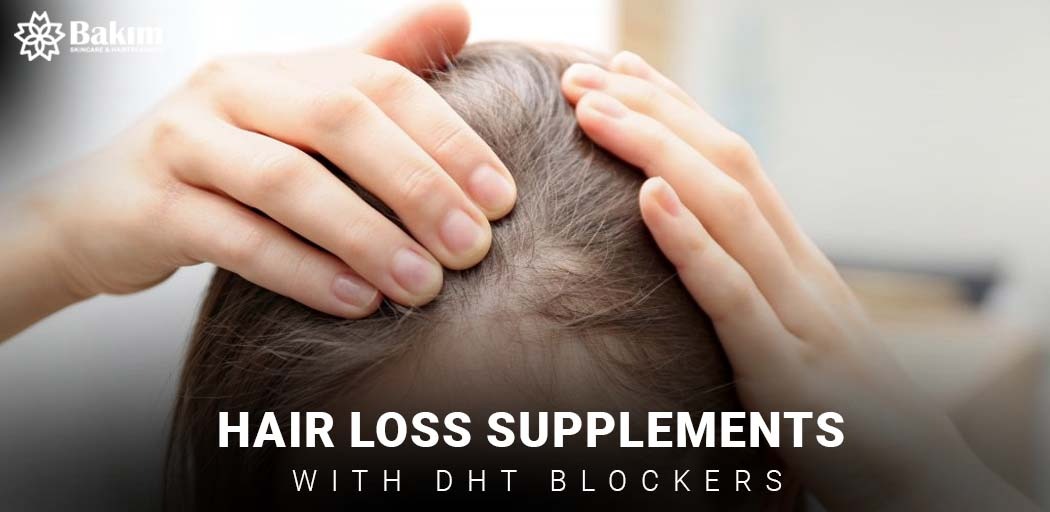Hair loss can be a distressing experience for both men and women, often leading to decreased self-confidence and emotional distress. While there are various factors contributing to hair loss, one significant culprit is dihydrotestosterone (DHT), a hormone derived from testosterone. DHT can bind to hair follicles, causing them to shrink and eventually leading to hair thinning and loss.
Understanding DHT and its Role in Hair Loss
DHT is a natural byproduct of testosterone, and it plays a crucial role in the development of male characteristics. However, when DHT levels are too high, especially in individuals genetically predisposed to hair loss, it can negatively affect hair follicles’ health. DHT binds to receptors in the scalp, causing them to shrink over time. This process, known as miniaturization, results in thinner, weaker hair strands and, eventually, hair loss.
What are DHT Blockers?
DHT blockers are substances that inhibit the production or activity of dihydrotestosterone in the body. By reducing DHT levels or blocking its effects on hair follicles, these blockers can help slow down or prevent hair loss and promote hair regrowth.
Types of Hair Loss Supplements with DHT Blockers
Natural DHT Blockers
- Saw Palmetto
- Pumpkin Seed Oil
- Pygeum Bark Extract
- Green Tea Extract
- Nettle Root Extract
Synthetic DHT Blockers
- Finasteride
- Dutasteride
- Minoxidil (when combined with other DHT blockers)
Benefits of Using DHT Blockers in Hair Loss Treatment
- Slowing Down Hair Loss: DHT blockers can help slow down the hair loss process by preventing the miniaturization of hair follicles.
- Promoting Hair Regrowth: By inhibiting DHT activity, these blockers can stimulate dormant hair follicles and promote the growth of thicker, healthier hair.
- Improving Hair Texture: Users often report improvements in hair texture and thickness after using DHT blockers consistently.
Potential Side Effects of DHT Blockers
While DHT blockers can be effective in treating hair loss, they may also come with potential side effects. These can include:
- Sexual Dysfunction: Some users may experience a decrease in libido or erectile dysfunction, particularly with synthetic DHT blockers like finasteride.
- Gynecomastia: In rare cases, DHT blockers may cause breast enlargement in men.
- Scalp Irritation: Topical DHT blockers, such as minoxidil, may cause scalp irritation or dryness in some individuals.
How to Choose the Right Hair Loss Supplement with DHT Blockers
When selecting a hair loss supplement containing DHT blockers, it’s essential to consider several factors:
- Ingredients: Look for supplements containing clinically proven DHT-blocking ingredients like saw palmetto, pumpkin seed oil, or finasteride.
- Formulation: Consider whether you prefer oral supplements, topical treatments, or a combination of both.
- Brand Reputation: Choose products from reputable brands with a track record of producing high-quality hair loss treatments.
- Consultation: Consult with a healthcare professional or dermatologist before starting any new hair loss treatment regimen, especially if you have underlying health conditions or are taking medications.
Best Practices for Using Hair Loss Supplements with DHT Blockers
To maximize the effectiveness of DHT blockers and promote healthy hair growth, consider the following best practices:
- Consistency: Use the hair loss supplement as directed and consistently to see optimal results.
- Patience: Hair regrowth takes time, so be patient and persistent with your treatment regimen.
- Healthy Lifestyle: Maintain a balanced diet, exercise regularly, and manage stress levels to support overall hair health.
- Avoid Harsh Chemicals: Minimize the use of harsh hair products or treatments that can damage hair follicles or exacerbate hair loss.
Lifestyle Changes to Support Hair Health
In addition to using DHT blockers, making certain lifestyle changes can also support hair health and promote hair regrowth:
- Nutrient-Rich Diet: Ensure you’re consuming adequate amounts of essential vitamins and minerals, such as biotin, vitamin E, and iron, which are vital for healthy hair growth.
- Scalp Care: Keep your scalp clean and moisturized to promote a healthy environment for hair follicles.
- Stress Management: Practice stress-reducing techniques such as meditation, yoga, or deep breathing exercises to minimize stress-related hair loss.
- Avoid Tight Hairstyles: Avoid hairstyles that pull on the hair follicles, such as tight ponytails or braids, as they can contribute to hair breakage and loss.
Combining DHT Blockers with Other Hair Loss Treatments
For more severe cases of hair loss, combining DHT blockers with other hair loss treatments may yield better results. Some complementary treatments include:
- Platelet-Rich Plasma (PRP) Therapy: PRP injections can stimulate hair growth by delivering growth factors directly to the scalp.
- Low-Level Laser Therapy (LLLT): LLLT devices emit low-level laser light to the scalp, promoting cellular activity and hair growth.
- Hair Transplant Surgery: In cases of advanced hair loss, surgical hair restoration procedures like follicular unit transplantation (FUT) or follicular unit extraction (FUE) may be necessary.
Case Studies and Success Stories
Numerous individuals have experienced significant improvements in their hair health and regrowth by incorporating DHT blockers into their hair loss treatment regimens. These success stories serve as inspiration for those struggling with hair loss and seeking effective solutions.
Conclusion
Hair loss can have a significant impact on an individual’s self-esteem and quality of life, but it doesn’t have to be permanent. Hair loss supplements containing DHT blockers offer a promising solution for slowing down hair loss, stimulating hair regrowth, and improving overall hair health. By understanding the role of DHT in hair loss, choosing the right supplements, and incorporating lifestyle changes, individuals can take proactive steps towards maintaining a healthy head of hair.
In conclusion, while DHT blockers can be effective in combating hair loss, it’s essential to approach treatment holistically and consider factors such as diet, stress management, and overall health. By combining DHT blockers with other hair loss treatments and adopting a healthy lifestyle, individuals can maximize their chances of regaining thicker, fuller hair and restoring their confidence.
FAQ’s
Q1: Are DHT blockers safe to use for long-term use?
While DHT blockers are generally safe for long-term use, it’s essential to monitor for any potential side effects and consult with a healthcare professional regularly.
Q2: Can I stop using DHT blockers once I see improvement in my hair?
It’s advisable to continue using DHT blockers as directed, even after seeing improvements in hair growth, to maintain results and prevent further hair loss.
Q3: Can DHT blockers be used in combination with other hair loss treatments?
Yes, DHT blockers can be combined with other hair loss treatments like minoxidil or laser therapy for enhanced results, but it’s crucial to consult with a healthcare professional before combining treatments.
Q4: Are there any dietary supplements that can help block DHT naturally?
Yes, several dietary supplements, such as saw palmetto, pumpkin seed oil, and green tea extract, are known to inhibit DHT production naturally.
Q5: How soon can I expect to see results with DHT blockers?
Results vary depending on individual factors, but noticeable improvements in hair growth and thickness may typically be observed within a few months of consistent use.


